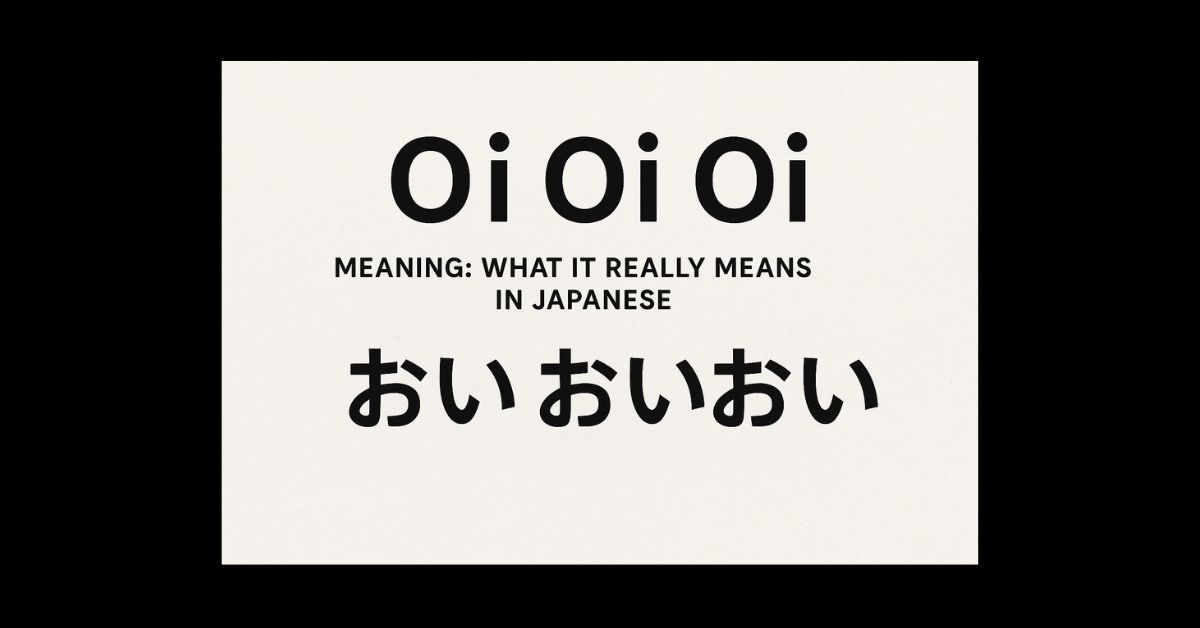Has anyone ever yelled “Oi oi oi! ” in anime or random Japanese TV shows and you were left wondering what that means? It’s a fun and cute phrase used to express surprise, disbelief, or playful reproach. What does oi oi oi mean in Japanese? It would be saying something like “Hey, come on now! ” or “No way? ” depending on the context and tone. You would also like to know what oi is in Japanese.
By itself, “oi” is an informal way to call someone’s attention, such as shouting “Hey!” In English. Undefined Such Japanese exclamations are typical of informal Japanese speech, particularly in anime and everyday speech. Studying them makes you sound more native-like and get along better with locals.
Want to start learning Japanese right away?
Get our free study guides full of simple grammar tips, helpful vocabulary, and intelligent study tips totally free!
What Does “Oi Oi Oi” Mean in Japanese?
The term “oi oi oi” (オイオイオイ) is a relaxed Japanese expression that you’ll commonly hear in anime as well as in daily conversations. It tends to be used when you’re surprised, don’t believe what you’re hearing, or when you want to scold someone lightly. So, how do you say oi oi oi in Japanese? That varies with the pitch and the context.
Here’s what it can imply:
- “Hey, wait a second…” — expressing surprise
- “Come on now…” — showing playful disbelief
- “You’ve got to be kidding…” — expressing prevention or doubt
- Light reproach — especially when someone does something silly
- Friendly attention grabber — often used in anime or informal chats
Now, what does oi mean in Japanese on its own? It simply means “hey” and is often used to get someone’s attention casually
The 3 Main Uses of “Oi Oi Oi” in Everyday Japanese
1. Expressing Sudden Surprise
Sometimes, one says “oi oi oi” if something strange suddenly occurs. It’s a direct reaction expressing shock or surprise in a light, friendly manner.
Example:
Your friend drops his phone into a puddle.
You: “オイオイオイ、スマホ大丈夫?”
You’re acting quickly, with concern but not irritation.
So what’s oi oi oi in Japanese here? It’s like “Whoa!” or “Hey, what’s going on?” in a playful tone. And what’s oi in Japanese by itself? It’s just an informal “hey,” usually used to get someone’s attention in everyday Japanese dialogue or anime scenes.
2. Showing Playful Disbelief
In informal Japanese, people tend to say “oi oi oi” whenever they hear something that seems hard to believe or a little too much. It’s not serious, it’s a tease, but in a friendly, playful manner.
Example:
Friend: “I completed all my homework in 10 minutes!”
You: “オイオイオイ、本当に?”
You’re calling them out, but softly.
So, It shows light disbelief, like saying “Come on now!” or “You’re joking, right?” And what does oi mean in Japanese? It’s still “hey,” but the tone here adds comedy and friendly doubt in informal Japanese conversations.
3. Gentle Admonishment
Oftentimes, “oi oi oi” is uttered when someone does something stupid or a bit wrong, but you don’t want to come across as being too critical. It’s a soft way to say, “Hey, that’s not good,” without being mad.
Example:
A child trips juice on purpose.
Parent: “オイオイオイ、何してるの?”
It’s soft-sounding, more of a concerned correction than a warning.
So, it’s a gentle warning like a “Hey hey hey, what do you think you’re doing?” And how do we say oi in Japanese? Simply “hey,” but when used with tone, it conveys emotion and heat. This type of Japanese interjection is frequent in casual everyday conversation, particularly with friends or loved ones.
Why Tone Matters When Using “Oi Oi Oi”
In Japanese, tone can completely flip the meaning of a sentence like “oi oi oi.” The same words can sound pleasant, funny, angry, or even rude depending on the tone you say it with. That is why you need to listen for voice, mood, and context when using informal Japanese expressions.
Here is how various tones modify the tone of oi oi oi:
- Soft and rising tone → signifies genuine surprise or light concern
- Long, drawn-out “oi” → teasing or mocking disbelief.
- Irritated and frustrated tone → sounds angry or angry
- Together with laughter → incorporates humor or scorn
- Calm and low tone → friendly but serious reminder
- Said with a smile → warm and light, like playfully teasing a friend
Cultural Context: When and Where to Use “Oi Oi Oi”
To truly know what “oi oi oi” entails, you should also learn when and where it is acceptable to use.
Appropriate Settings:
- Chatting informally with your close friends
- Light moments with family at home
- Hanging out in a relaxed group environment
- Reacting during enjoyable game or match situations
- Joking with classmates or co-workers
- Watching anime or dramas with others and analyzing scenes
Inappropriate Settings:
- Speaking at a formal meeting or business environment
- Talking to elders or authority figures
- Religious or cultural ceremonies
- Presentations and speech delivery
- During exams at school and other academic interviews
- During first encounter with the person professionally
Although “oi oi oi” is fun and casual, it can’t be used for a serious situation.Using it in an unsuitable setting can be sometimes offending.Language variation is always up to the place; in Japanese conversations.
Alternative Expressions Similar to “Oi Oi Oi”
There are other fun expressions in Japanese that feel similar to “oi oi oi” and are used in casual moments. Just like what does oi oi oi mean in Japanese, these phrases also show surprise, concern, or mild reaction in a friendly way.
- Ara ara (あらあら): Often used by women, especially older ones, to gently show surprise or concern.
- Maa maa (まあまあ): A soft phrase used to calm a situation or tell someone to take it easy.
- Chotto chotto (ちょっとちょっと): A light way to say “wait a minute” or get someone’s attention casually.
Now, if you’re still wondering what oi means in Japanese, it simply means “hey” but when said with feeling, it adds real emotion.
Practical Tips for Using “Oi Oi Oi” Naturally
- Start in safe situations: Try using it with friends, in anime discussions, or when joking casually so you can get used to the tone.
- Listen to native speakers: Watch anime or Japanese dramas to hear how real speakers use “oi oi oi” in different emotions.
- Practice your tone: Saying “oi oi oi” flatly won’t work, try practicing different feelings like surprise or doubt to sound natural.
- Use the right expression: Your face matters too! Match your words with a surprised or playful look to get it right.
- Repeat what you hear in anime: Mimic lines where characters say “oi oi oi” and feel the time and mood.
- Record and review yourself: Say it out loud, record it, and compare it to native speakers for better stress.
Wrap Up: Mastering the Oi Oi Oi Meaning
Now that you’ve learned how it works, you know that “oi oi oi” isn’t a made-up anime noise, it’s an actual, common Japanese expression. It may express surprise, disbelief, or a soft warning, depending on how it is spoken. It means “Hey, what’s up? ” or “Come on!” but in an amused, emotional manner. Mastering these types of Japanese screams makes your conversations more natural-sounding and enjoyable.
And besides, it’s worth knowing what does oi mean in Japanese as a standalone word. It’s a straight forward “hey,” usually said to call someone’s attention. But said three times like “oi oi oi,” it gives tone, feeling, and personality to the moment.These types of phrases are an essential part of everyday Japanese conversation and are present in anime, family conversations, or friendly conversations with friends.
Being mindful of tone and context will help you in using them correctly. If you want to sound more like a native speaker, small things like “oi oi oi” make a big difference. Observe how characters in anime or actual individuals in videos use it, and see if you can practice it yourself. These Japanese reaction words and slang expressions are wonderful aids to developing day-to-day facilities. Listen more, repeat more, and experiment more, and the more natural your Japanese will be.
Q&A: Quick Answers About “Oi Oi Oi” Meaning
Q: What does “oi oi oi” mean in Japanese?
It means surprise, disbelief, or playful reproach like saying “Hey, seriously?” in casual, emotional Japanese conversations.
Q: Is “oi oi oi” formal or informal?
It’s completely informal and should only be used with friends, family, or in casual Japanese settings like anime or texting.
Q: Can “oi oi oi” be offensive?
If said with a harsh tone or in a formal place, it can feel rude. Tone and setting really matter.
Q: Is “oi oi oi” the same as the English “oi”?
Not exactly. Both grab attention, but oi oi oi in Japanese adds emotion, surprise, or playfulness, depending on the tone.
Q: What does it mean when someone says oi oi oi?
They’re reacting with shock or disbelief, often in a fun or surprised way during informal Japanese speech or anime scenes.
Q: What does “oi oi oi baka” really mean?
It usually means “Hey hey hey, you idiot!”a teasing or angry phrase often heard in anime or close friend circles.
Conclusion
Knowing what oi oi oi mean in Japanese makes you interact more automatically in informal Japanese discussions. It’s a teasing, emotive expression to express surprise, disbelief, or mild correction, depending on your variety.
Knowing what does oi mean in Japanese alone, typically translating as “hey” or “hey you” makes sense of how deep and expressive the complete “oi oi oi” can get. It’s informal, fun, and often heard in anime, friendships, or relaxed situations. Use it with care, match the mood, and you’ll sound more natural. Mastering these little expressions makes your Japanese feel more human, real, and culturally rich.

